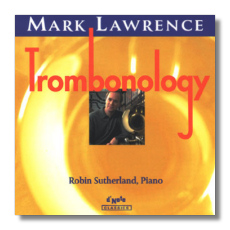
The Internet's Premier Classical Music Source
Related Links
- Latest Reviews
- More Reviews
-
By Composer
-
Collections
DVD & Blu-ray
Books
Concert Reviews
Articles/Interviews
Software
Audio
Search Amazon
Recommended Links
Site News
 CD Review
CD Review
Trombonology

- Jean-Michel Defaÿ:
- Dance #1 "Danse sacrée"
- Dance #2 "Danse profane" - Samba
- Franz Strauss: Nocturno for Horn & Piano, Op. 7
- Tomaso Albinoni: Concerto à cinque in D minor, Op. 9 #2
- Benedetto Marcello: Sonata for Cello & Continuo in A minor, Op. 1 #3
- Jules Massenet: Tha´s - Meditation
- Jacques Castérède: Sonatine
- Tommy Dorsey: Trombonology
- Frank Martin: Ballade
- Malcolm Arnold: Fantasie for Trombone Solo
Mark Lawrence, trombone
Robin Sutherland, piano
d'Note Classics DND1012
A recital by the Principal Trombone of the San Francisco Symphony Orchestra. The scant repertory must frustrate a virtuoso trombonist. I can't think of a concerto by a major composer, except for Bloch's Symphony for Trombone and Orchestra, which runs slightly under sixteen minutes. The list of major works spotlighting the instrument even in chamber settings is pretty short. Much of the time, performers deal with transcriptions, as is the case here. Some of the transcriptions work better than others. I didn't care for the Albinoni, not because of the trombone, but because I felt the piano a poor substitute for the strings. On the other hand, the quicker movements of the Marcello are too full of obviously string riffs to translate really well to the trombone. The Massenet, originally played by the violin, needs the longer line provided by a stringed instrument. The Meditation sounds almost literally out-of-breath, as we hear the audible snatch of air from Lawrence in mid-phrase. The Strauss (Richard's pop), originally for French horn and here played on an alto trombone, comes off the best – not surprising, since the composer builds breathing spaces into the line. Lawrence has a lovely tone indeed and makes his instrument sing in this poetic bit of Schumanniana.
The needs of the player are, again, built into the pieces conceived for trombone. Except for the Martin and the Arnold, I'd not heard even of most of the composers before. The Martin has become a classic for the instrument, and the composer orchestrated what was originally written as a competition piece in 1940. As the liner notes point out, the main reason why it's not performed by symphonies is probably that it lasts only eight minutes – a fine eight minutes, however. Despite the structural looseness the title implies, Martin has in fact written a very tight piece, idiomatically reminiscent of Honegger – beginning with a dream-like aria and ending with an agitated flight. To me, this rates as the best performance on the album – a unanimity of interpretation and the nearest-to-equal ensemble balance between trombonist and pianist.
Malcolm Arnold wrote a series of solo "fantasies" for various instruments toward the end of his career. Most of them seem like witty blueprints for the kind of music that best suits their instruments. I don't mean to imply that the music is bland – far from it. The trombone fantasy in particular packs many surprises into its three minutes from the opening bar, not the least of which is a beautifully contemplative slow movement. A virtuoso trumpeter himself, Arnold certainly knows how to write for the brass family. His Fantasy tests both the trombonist's long line and sharpness of articulation – tests Lawrence passes with grace and humor.
The two works by Frenchmen Jean-Michel Defaÿ and Jacques Castérède show the Gallic enthusiasm for jazz, cool and hot. Defaÿ begins with a smoky blues and ends with a samba. One would think that an American who grew up with the stuff all around him would do better than Lawrence can manage, but it's really just another case of a conservatory-trained kid who "got all that nonsense whacked out of him." He's rhythmically too blasted stiff, both in the blues ("Danse sacrée") and in the samba ("Danse profane"), although he does manage to pull off an exciting screamer of a high note at the end. Throughout the samba I kept wondering what the great Ellington alumnus Juan Tizol would have made of it. Sutherland does much better at suggesting the origins of Defaÿ's inspiration. Castérède approaches jazz by way of Milhaud and Les Six, with, oddly enough, a highly contrapuntal approach to hot jazz, much like the Creation du monde. Lawrence can get through this with more success, since it resembles more closely the music he's used to playing.
I had great hopes for Tommy Dorsey's big-band classic "Trombonology," the album's title cut. However, the performance comes off as a stunt, taken at slightly too fast a clip. The work sounds rushed and stiff. Again, Sutherland comes closer to real swinging than Lawrence does.
Copyright © 1996, Steve Schwartz




















